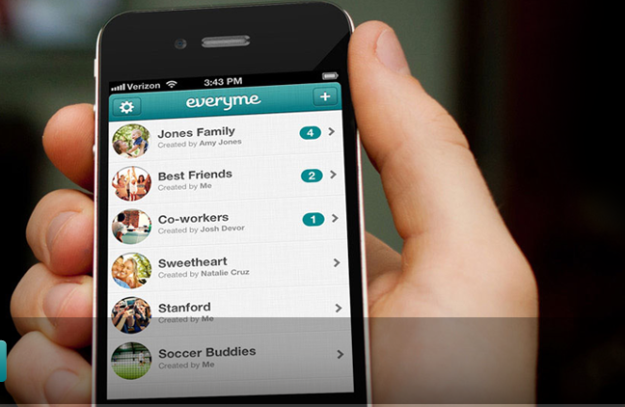 Facebook alternative EveryMe launched last month, introducing us to its very Path-like user interface and emphasis on grouping contacts. The then mobile-only app set itself apart from the pack a bit with its sophisticated system for created groups automatically.
Facebook alternative EveryMe launched last month, introducing us to its very Path-like user interface and emphasis on grouping contacts. The then mobile-only app set itself apart from the pack a bit with its sophisticated system for created groups automatically.
Now Everyme is expanding to Android as well as the Web, and launching a better attack to grab Facebook cynics. According to Everyme, it has amassed 400,000 within the past month, and it wants to build on that momentum. “Everyme’s early success demonstrates the powerful need for a social network with total privacy,” says co-founder and CEO Oliver Cameron. “The introduction of Everyme for Android and web, as well as the updated iOS app, will dramatically expand our reach and solidify our position as the perfect alternative to Facebook.”
It’s a formidable challenge to declare, but similar apps have picked up steam with it recently. Path is the obvious comparison here, but one you should be careful about making. Co-founder and CTO Vibhu Nordby tells me where they divide. “With Path, they have a friending model, and other social networks like Facebook do too – and we don’t have that because we think [it leads to being friends with] random people.”
There’s no bad blood, however. “We really like Path here. We’re all competing for a share of the people disillusioned with Facebook.


A feature called Magic Stories is what pulls information from your circles to popular the app. It grabs in activity from Facebook, Twiter, Instagram (a new addition), and LinkedIn to pull in the important information – sort of how Facebook has a ranking system for popular updates or Twitter now has a newsletter: birthdays, moving, babies, promotions, weddings, etc. These get some special treatment in Magic Stories.
Where Everyme really defines itself though is privacy. All of your Everyme activity stays there and there alone: there is no “push” to Facebook or Instagram or Twitter or Google+ function. In a Worldwide Web where everything is little pieces of everything else combined to make the self-proclaimed “ultimate social network,” it’s refreshing that Everyme is stepping outside this box a little with its truly privacy-focused system. You share with your curated Circles, or you don’t share at all. “We don’t offer users options to share anything publicly,” says Norby. “When you let them do that you can compromise the privacy of your entire network.”
He also explains how Everyme keeps things completely above the surface with users. “We’re transparent about who you share stuff with, and with other social networks it’s sometimes unclear who you’re sharing with. And everyone in a Circle knows who’s in the Circle – you can feel really comfortable knowing who those people are.”
In the pipeline for Everyme are “tons of updates” to come, including those new photo filters for the Android app, and possible for Web. Norby also says there will be other features for showing more types of content down the line.
Editors' Recommendations
- How to get developer options on your Android phone
- Google is launching a powerful new AI app for your Android phone
- How to use Android Recovery Mode to fix your phone or tablet
- Your Android phone is getting lots of fun new features this month
- Trusting mobile apps to identify plants might cost you your life


